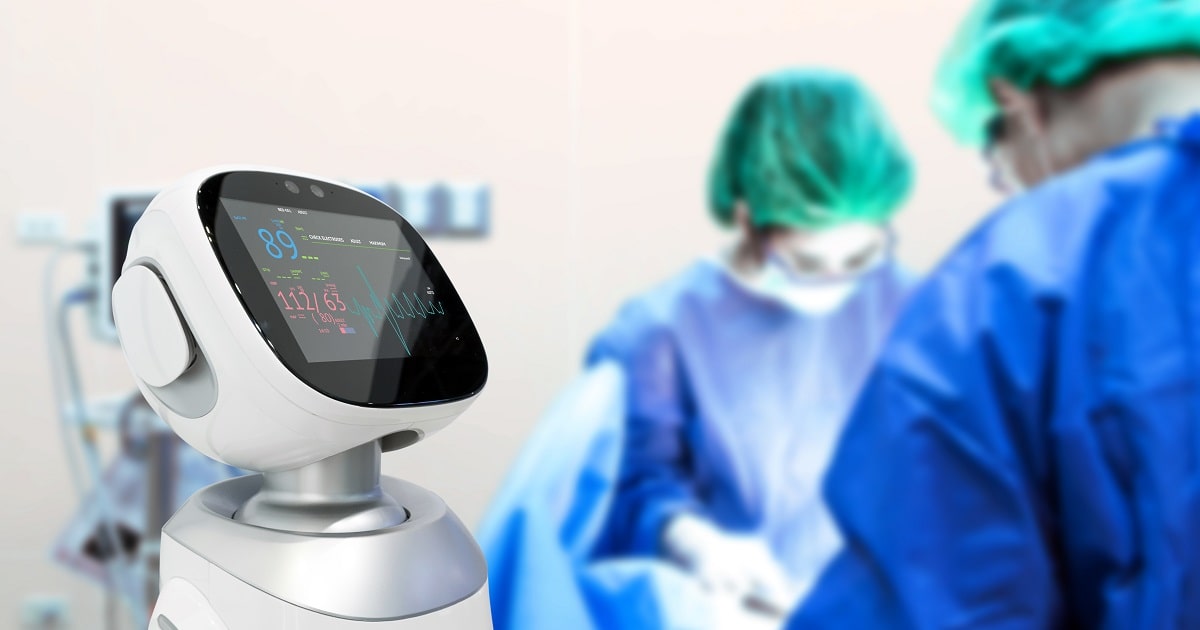
Health Technology, Digital Healthcare
Article | August 16, 2023
Virtual reality (VR), the new technological advancement, is set to transform practices in the healthcare industry. According to Statista, it is estimated that, by 2022, the second largest market share of VR will be from the healthcare industry. Virtual reality in healthcare operates in various divisions to offer a greater quality of patient care and performance of medical professionals. For the health and healthcare industry, from the clinical process to the user, VR has a multitude of applications such as tutoring future doctors, generating new life-saving routines, etc.
Virtual reality in healthcare can confront the challenges in the industry, including efficiently handling huge healthcare databases, training and development of medical professionals, patient engagement, disease awareness, medical marketing, patient treatment, etc. Virtual reality in the healthcare market, according to a report from Reports and Data, is expected to reach USD 8.03 billion by 2027 from USD 2.06 billion in 2019.
This article discusses how virtual reality in healthcare is going to transform the industry by applying it in various divisions such as medical training, patient treatment, patient engagement, disease awareness, and medical marketing.
Virtual Reality in Healthcare Training
VR in healthcare can transport you to areas, inside of the human body, that otherwise would be impossible to access and view. Medical students currently use cadavers to learn, but cadavers do not react the same way live patients do. Also, cadavers are very difficult to get hold of. When VR is used in healthcare training, students can view even minute detail of all parts of the body. This view is possible in stunning 360° CGI reconstruction and creates training scenarios, which would replicate real surgical procedures.
Virtual Reality in healthcare can be used to deliver high-quality surgical training. Using virtual reality, 4K 360° video of real-life surgery is filmed from multiple angles. Then it is combined with CGI models of the anatomy, which is being operated. This advanced use of virtual reality in healthcare provides medical students with an interactive and immersive training experience.
Treatment
Patient Education
The ability of virtual reality in healthcare to see inside of the human body is useful for both doctors and patients. With the help of VR, doctors can take patients through their surgical plan. This is made possible by a virtual view of the anatomy and pathology of patients through a patient-specific 360° VR reconstruction. The result of this is an enhanced understanding of the treatment for patients and higher patient satisfaction.
Robotic Surgery
Robotic surgery is a recent innovation. A robotic device, such as a robotic arm, is used in a robotic surgery while being controlled by a human surgeon. This utilization of virtual reality in healthcare makes sure of fewer or no risk of complications in surgeries. This also makes the surgeon finish the surgery procedure faster with greater accuracy. The robotic devices are accurate with reduced blood loss, smaller incisions, and faster recovery.
Mental Health and Psychological Therapy
The unique ability of virtual reality technology to take you anywhere virtually can be utilized to create a powerful virtual reality simulation in healthcare of various scenarios in which psychological issues occur. This eliminates the necessity of a therapist accompanying patients to various scenarios such as a tall building or a crowded shopping center to provide proper counseling. These scenarios can be easily created with virtual reality technology in healthcare. Virtual reality in healthcare market has also been used to help autistic children in the classroom, curb memory loss, and gather data for dementia research.
Pain Management and Physical Therapy
Apart from psychological issues, the healing capabilities of VR are also used in pain management and physical treatment. According to a study by the UW Harborview Burn Centre and the University of Washington Seattle, a full VR immersion acted as a distraction for patients, who were undergoing physical therapy after a skin graft. This distraction subsequently reduced their feeling of pain.
Virtual reality in healthcare is also found to be effective in reducing recovery time in physical therapy. Patients performing their daily exercises in a virtual environment, find the task to be more fun than usual. It also keeps the patients focused and helps them keep their spirits up and recover sooner.
Patient Engagement
With the help of virtual reality in healthcare, patients can experience a virtual tour of the inside of their bodies before surgeries. This is a 360-degree, three-dimensional (3D) tour. This enables patients to know their body, anatomy, and pathology, before the surgical procedures. Virtual Reality Medical Visualization platform is developed for the tour.
These advancements with virtual reality in healthcare engage patients thoroughly, which reduces tension and lead to a speedy recovery.
Medical Marketing
The most popular and initial application of Virtual reality was marketing. Still, it continues to be one of the most effective and powerful marketing tools. The ability to use VR to project the future of healthcare is the most powerful tactic in healthcare marketing. With Virtual reality in healthcare, one of the most powerful tactics that you can have to market in the industry is to show people what changes they can expect when they start or stop exercising, lose or gain weight, the progress they make through cancer treatments, etc.
As the possibilities of virtual reality in healthcare are endless, healthcare professionals and providers can attract more patients, doctors with high caliber, and nursing staff to your facilities. When those are in short supply, virtual reality in healthcare can be used as an excellent healthcare marketing tool to ensure expected results.
Disease Awareness
AbbVie, a pharmaceutical research & development company, created an experience to educate medical professionals and raise awareness among them regarding the daily struggle Parkinson’s disease patients undergo. The experience was demonstrated at a pharmaceutical industry trade show. People put on a headset and experienced how Parkinson’s sufferers navigate a virtual supermarket, meeting with difficult moments when they come in contact with other people.
Such experiences with virtual reality in healthcare help raise awareness for various diseases among professionals and patients. Virtual reality presentations can be conducted to raise awareness of certain diseases.
The Future of Virtual Reality in Healthcare
A lot of applications of virtual reality in healthcare are in their nascent stage. In the coming years, virtual reality will be used more in healthcare, which will improve the effectiveness and accuracy of present procedures. It will also enhance the various human capabilities, for both patients and medical professionals. Virtual reality in healthcare has huge potential, but only limited by the ingenuity and creativity of people who create and apply the technology. VR will surely transform medical training, physical and psychological therapies, rehabilitation, mental health treatments, and patient engagement, among others.
Virtual reality in healthcare holds the power to transform the way doctors are trained and treatment is provided to patients. According to reports from various market research companies, especially research done by Grand View Research, predict that, by 2025, virtual reality in the healthcare market will grow to a whopping US$5.1 billion. The major driving forces behind this growth are Rapid technological advancements in the healthcare industry and driving demand for rehabilitation and simulation training.
Frequently asked questions
How is virtual reality used in healthcare?
In healthcare, virtual reality is used in treatment, training, and to raise awareness among medical professionals and patients regarding various diseases. Patients and doctors are made to view the inside of the human body using virtual reality.
Where is virtual reality used in healthcare?
Virtual reality is used in various sectors of healthcare to deliver high quality patient care. Treatment with the assistance of virtual reality also increases the efficiency of medical professionals. Virtual treating is applied in all aspects of medical treatment.
What are the benefits of virtual reality?
Virtual reality in healthcare saves both, the time and money of healthcare providers. It also makes the work of medical professionals more convenient. It eliminates unnecessary travel for treatments by making appropriate decisions.
How virtual reality is changing healthcare?
Virtual reality is changing the healthcare by providing different advanced ways of treatments, especially for physical and psychological therapy, surgeries, pain management, and stress management and by assisting the rehabilitation process effectively.
Read More

Health Technology
Article | September 12, 2023
In the ever-evolving healthcare landscape, transparency in pharmacy benefit management (PBM) has emerged as a critical issue. The discussion surrounding driving down prescription drug costs and increasing access to affordable medications has brought attention to the practices of PBMs. However, achieving true transparency requires more than just buzzwords; it necessitates access to real-time data that empowers consumers to make informed decisions about their healthcare. In this piece, we will explore the importance of real-time transparency in PBMs and highlight how Xevant, a leading platform, is revolutionizing the industry.
The Current State of PBM Legislation
With over 100 bills to reform PBM practices, legislative efforts are intensifying to address the business practices associated with PBMs. However, one common concern is the absence of language surrounding real-time automation in many of these bills. The lack of such provisions threatens to undermine the effectiveness of the proposed reforms. It is crucial to examine the available resources and insights to gain a comprehensive understanding of the issue. The current state of PBM legislation and the efforts to reform PBM practices highlight the pressing need for transparency and accountability in the pharmaceutical industry. PBMs play a critical role in the drug pricing ecosystem. Still, concerns about “traditional” PBM business practices, such as lack of transparency and opaque rebate systems, have raised questions about their impact on drug prices and patient access to affordable medications.
Xevant's Groundbreaking Solution
Xevant, led by CEO Brandon Newman, stands at the forefront of the drive for transparency in PBM practices. As the only platform capable of providing PBMs and consumers with real-time, automated, and completely transparent data from the entire pharmacy benefits ecosystem, Xevant is poised to revolutionize the industry against the backdrop of the political landscape.
The absence of language surrounding transparency and real-time automation in many proposed bills threatens the effectiveness of the reforms. Yet, innovative companies like Xevant are leading the charge for openness in PBM practices. Xevant's real-time data automation and optimization capabilities empower consumers with timely, comprehensive, and transparent information, enabling them to make informed decisions about their healthcare and potentially save money.
With the potential passage of these bills, the pharmaceutical industry could see a shift towards greater accountability, fairer pricing practices, and improved access to affordable medications. The reforms could also create a more level playing field for generic drug manufacturers, fostering competition and lowering prices.
Real-Time Data Automation and Optimization
Newman emphasizes that transparency cannot be achieved without access to real-time data automation and optimization. This real-time, customized data enables individuals to compare prices, explore alternatives, and understand the specific cost components related to their medications. By bringing together various parts of lowering drug costs, such as drug rebates, 340B contracts, sell-side discounts, copay assistance, and employer negotiations, Xevant offers a solution that empowers consumers with the information they need when required.
The Implications of Timely Access to Data
The scarcity of timely access to data among many traditional PBMs is a significant challenge in achieving transparency in the pharmaceutical industry. These PBMs typically collect data annually, which leaves a substantial margin of error and can result in millions of dollars lost from consumers' pockets. In contrast, Xevant's capabilities offer a game-changing solution.
With Xevant's platform, consumers gain immediate access to critical information regarding drug rebates, markups during spread pricing, competitive alternatives, and the vast landscape of the pharmaceutical ecosystem. Having these complete datasets available in real-time allows individuals to make informed decisions about their healthcare and potentially save lives. The significance of timely access to data cannot be overstated, as transparency becomes meaningful only when it happens in the present rather than months, or even a year, later than when the impact has already occurred.
Navigating Proposed Legislation and Questionable Business Practices
Another critical aspect of the PBM landscape that Xevant addresses is the moral implications associated with cost-sharing, clawbacks, spread pricing, and the pass-through of rebates. These practices have long been criticized for their opacity and their negative consequences on patients' access to affordable medications. Xevant's transparency-focused approach highlights these practices, allowing stakeholders to evaluate their ethical implications and work towards fairer alternatives.
Xevant recognizes that proposed legislation may have potential cracks that allow for slip-through and the continuation of questionable business practices. Delayed and inaccurate reporting are loopholes that can hinder the effectiveness of reform efforts. By actively engaging with legislators and industry stakeholders, Xevant aims to identify these potential shortcomings and advocate for comprehensive robust legislation that leaves no room for exlploitation
The Future of Healthcare and the Role of Real-Time Automation
As the discussion surrounding PBM reform gains momentum, the future of healthcare in America hangs in the balance. Xevant sets a new standard for efficiency and consumer empowerment in healthcare decision-making by employing AI-driven technology. Xevant's visionary approach to real-time data automation and optimization paves the way for greater transparency and cost savings in the pharmaceutical industry.
Wrapping Up
Transparency in pharmacy benefit management is crucial to addressing the soaring costs of prescription drugs and enhancing access to affordable medications. Without access to real-time data and automation, the pursuit of transparency remains elusive. Xevant's groundbreaking platform solves this pressing challenge, enabling PBMs and consumers to access complete, transparent data in real-time.
As legislative efforts progress, the need for real-time transparency becomes increasingly evident, and Xevant emerges as the leading legal solution for PBMs. When harnessing the power of real-time data automation, the vision of affordable healthcare can be transformed into a reality, benefiting individuals and the entire healthcare ecosystem.
Read More

Health Technology, Digital Healthcare
Article | July 14, 2023
Anesthesia groups face major challenges in the aftermath of the pandemic: Financially strapped hospitals are increasingly unwilling or unable to pay anesthesia subsidies, and a shortage of qualified anesthesiologists and CRNAs is making recruitment extraordinarily competitive.
The good news is that anesthesia opportunities are plentiful in the ambulatory surgery center (ASC) market. As more inpatient procedures migrate to ASCs, anesthesia practices can help meet demand by working with hospitals and ASCs. A dual-contracting approach can help increase revenue, reduce operational risk, enhance recruiting leverage, and present opportunities for equity investments in ASC ventures.
Expanding ASC Case Mix
Multiple factors are driving increased ASC volume.Consumers have long been attracted to the convenience andfast turnaround timesASCs offer, and as the pandemic began to take hold and patients worried about becoming infected in hospitals, theirpopularityincreased.
But even before the pandemic hit, theuse of ASCs was growing,with the number of centers increasing 7.1% annually since 2016.1No doubt this was in part driven by Medicare restricting fewer surgeries to the inpatient only (IPO) setting. This year alone, Medicare is adding 11 orthopedic procedures to the ASC-approved list, including total knee arthroscopy (TKA) and total hip arthroscopy (THA).2Commercial payersare alsofuelingASC volume by promotingthis venue as a lower-cost option to members.Lastly, with more than 90% of ASCs at least partially owned by physicians,providers themselvesare driving moreprocedures to this setting.
Hospitals Become ASC Buyers
For years, hospitals viewed ASCs as direct competition and discouraged or even prohibited inpatient anesthesia practices from contracting with them. But that dynamic is changing as more hospitals become buyers or majority investors.
According to a recent survey, the percentage of hospitals and health systems planning to increase their investments in ASCs rose from 44% in 2019 to 67% in 2020, with 75% of 200-plus-bed hospitals already owning more than one ASC.3Hospitals view these investments as a way to enhance physician relationships and increase surgical capacity.
The Benefits of Practice Diversification
For anesthesia practices that elect to contract with both hospitals and ASCs, a key benefit is improved profitability, since average ASC case reimbursements are higher than average hospital cases due to better payer mix and more efficient room turnover. Groups that work with multiple organizations also reduce their institutional or operational risk by limiting their exposure to potential financial problems associated with a single contracted entity.
Practices likewise gain an edge when it comes to recruiting in today’s highly competitive anesthesiologist and CRNA market. One of the chief benefits of ASC involvement is being in a position to offer a better work-life balance by spreading call responsibilities across a larger physician call pool. The math is simple: If a hospital group has seven physicians, each must provide call coverage once a week. But if the group also contracts with five ASCs and brings on five additional doctors to staff the facilities, individual call responsibilities are reduced to once every 12 days.
The importance of mitigating call duties to improve the work-life balance for both experienced clinicians and new hires can’t be overstated, particularly as hospitals work to streamline OR throughput by increasing the number of surgical procedures. Groups can also explore a range of creative compensation approaches, including essentially selling call opportunities to newly hired or recent graduate anesthesiologists as additional avenues to attract qualified clinicians while easing the burden on senior anesthesiologists.
Equity Opportunities
Among the most intriguing aspects of ASC involvement is the potential for becoming an equity stakeholder in the business. Surgeons traditionally have been the primary drivers in creating ASCs, but new opportunities exist for anesthesiology groups, particularly if their hospital is buying an existing ASC or developing a new ASC venture and looking to diversify the ownership group.
The idea of anesthesia ownership isn’t as crazy as it might sound. Like surgeons, anesthesiologists are integral to the success of an ASC, and like surgeons, they get there early and stay late. It’s no secret that joint ownership can greatly improve relations between the practice and the hospital, since both are now working toward the same objectives.
Groups can also make more money. I met with a surgical group not long ago with a 49% ownership stake in a hospital. That equity generated an additional $80,000 per year for each physician partner. How much you can make, of course, depends on your specialty, your level of ownership, and the volume of business. But you’ll never know until you try.
Outside Expertise
The pandemic has unleashed numerous changes throughout healthcare, and where the dust will eventually settle isn’t entirely clear. But what is certain is that for organizations to remain viable, they’ll need to be flexible and look hard at nontraditional business opportunities. Contracting with both hospitals and ASCs represents one such approach for anesthesia groups.
If you’re interested in exploring this and other business possibilities but don’t know where to start, Change Healthcare can help. Our team of expert anesthesia practice-management consultants have an average of 18 years’ experience in the specialty. We can be engaged on a per-project basis or we can provide our consultant services as part of our turnkey anesthesia-billing solution.
Our anesthesia revenue cycle management services can be deployed either on our own proprietary anesthesia-billing platform or on your hospital billing system. Either way, we’ll provide seamless, end-to-end service.
Read More

Digital Healthcare
Article | December 27, 2021
Affordable healthcare is the need of the hour and interoperability is the means to that end. The healthcare ecosystem is looking into ways they can enable this affordability as soon as possible, and that is where FHIR comes in. FHR promises an on-demand exchange of secure healthcare information. It has become an increasingly popular protocol, thanks to its commitment to ensuring interoperability in the app economy, via apps.
The privilege enjoyed by consumers and participants in most industries is the ease of accessibility of information. With most of it being on the cloud, a URL ensures access to the same information regardless of where it is being accessed from or which internet enable device. This is the privilege FHIR aims to introduce in healthcare, over the current document-based approach where forms are either faxed, emailed, or electronically exchanged.
FHIR is for
Building new healthcare apps
Develop cloud-based health apps that integrate with social networks
Providing a simple to use standards-based API for cloud-based health integration services
The government looking to implement a national EHR
FHIR Aims to Reduce Cost
The medical expenses of an average American in a year are north of $12k and rising. The reasons are the unnecessary complications in the healthcare IT infrastructure. With FHIR, HL7 aims to reduce the burden on providers in sharing and accessing healthcare data at the point of care, thereby reducing the administrative expenses spent on moving data back and forth. It also promises to grant on-demand access to patients – enabling them to make better-informed healthcare decisions.
What is part of FHIR?
Pre-defined Resources and API
A common way to represent data as building blocks and rules for connecting them
Target support for common scenarios
Implementer Friendly
Familiar tooling and technologies using web standards
Multiple Libraries available for faster implementations
Mobile Friendly
Concise and easily understood specifications, RESTful API and JSON
Leverages cross-industry web technologies
Multi-paradigm
Thick client, browser, or mobile devices
Supports human readability as the base level of interoperability
Large Community for Support
Heaps of open-source software and training events, webinars, and connectathons
Specification feedback welcomed, including update requests-tracker
Out-of-the-box Interoperability
Base resources can be used as it is, can also be adapted for local requirements
Seamless exchange of information using messages or document
Start The FHIR
Health plans are jumping on the FHIR bandwagon faster than ever thanks to the Interoperability and Patient Access rule as well as the latest proposals. Do not get left behind or sustain the ramifications of non-compliance with CMS regulations.
Read More